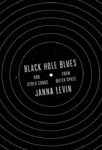Proving Einstein Right
 On Feb. 11 of this year scientists proved Einstein’s theory of gravitational waves. It was an idea many thought could never be tested, much less proven, but an intrepid group of scientists worked for decades to do just that.
On Feb. 11 of this year scientists proved Einstein’s theory of gravitational waves. It was an idea many thought could never be tested, much less proven, but an intrepid group of scientists worked for decades to do just that.
Nonfiction author and novelist Janna Levin, a physicist and astronomer herself, has written a book about the quest: Black Hole Blues and Other Songs from Outer Space (PRH/Knopf; RH Audio; BOT; OverDrive Sample).
Yesterday, on the PBS NewsHour Bookshelf conversation, Levin explains that scientists were actually able to hear gravitational waves and “like mallets on the drum. They rang space-time itself.”
In what is a science adventure book, Levin details how a small number of determined and insightful researchers bet their careers on the concept that the waves not only existed but could actually be heard. She witnessed the process of building detector machines, the rivalries and jealousies of those involved in the project and “realized that this could actually read like a novel. And if you followed these characters, you could understand not only the process of science, but the internal ambitions and the drives.”
No one thought the project would work as well or as early as it did, she continues, “and then it struck. It came from 1.3 billion years ago. It struck Louisiana. About 10 milliseconds later, it crosses the continent and hits Washington state and rings that machine. It is a spectacular detection.”
Summing up the meaning of the discovery Levin says,
“You know, Galileo was just looking at the moon and Saturn. He didn’t foresee that there were hundreds of billions of stars in collections called galaxies, or that there were quasars powered by black holes … what a lot of us hope is that the future will be so vast, beyond what we have even imagined, that there are dark sources out there that will ring these detectors, they will record the sounds of space, and there will be things we have never even predicted before.”
Reception to the book is mixed. A front page NYT “Sunday Book Review” states, “Taking on the simultaneous roles of expert scientist, journalist, historian and storyteller of uncommon enchantment, Levin delivers pure signal from cover to cover. … what makes the book most rewarding is Levin’s exquisite prose, which bears the mark of a first-rate writer: an acute critical mind haloed with a generosity of spirit.”
The daily NYT nonfiction reviewer, Jennifer Senior, however, is far less generous, writing “Awkwardness is everywhere … Editors. Where are they.”
But readers are not bothered. The book is currently ranked just outside of Amazon’s Top 100 and libraries are showing strong holds on light orders with several locations we checked tipping over a 3:1 ratio.
A succinct explanation of gravitation waves below:
